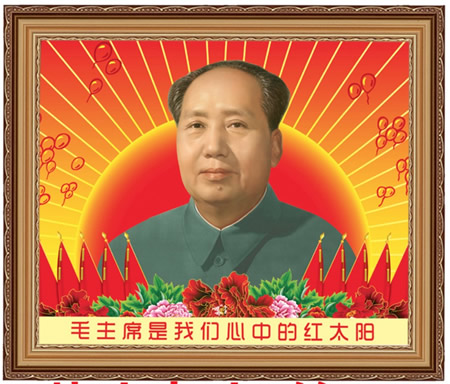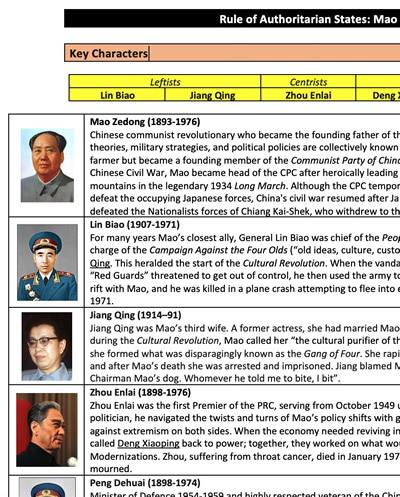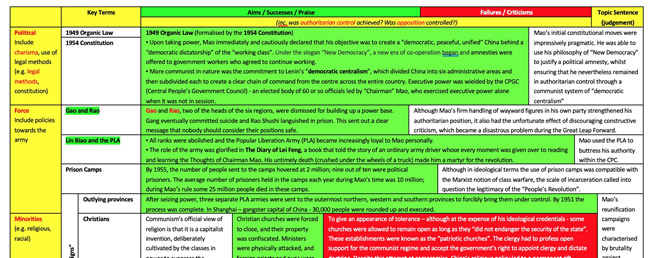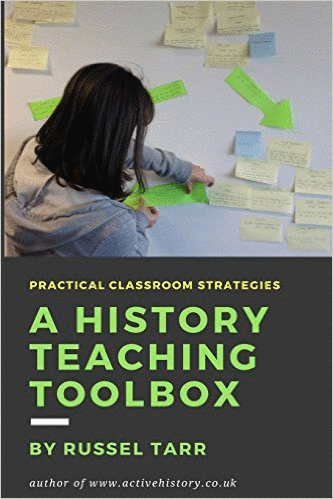The Rule of Mao Zedong in China, 1949-76

The rule of Mao Zedong is an excellent topic of study. Not only does it provide a valuable insight into the development of modern China, but it is punctuated by clear, dramatic and memorable policies and indviduals which make it engaging to teach and relatively easy to debate.
In terms of other dictators which arecovered in depth on ActiveHistory, you might like to consider the rule of Lenin, Stalin, Hitler, Saddam Hussein, Castro, Mussolini or Pinochet.
1. Which 20th Century Dictator are YOU?
I start this topic by getting students to complete the ActiveHistory interactive simulation "Which 20th Century Dictator are YOU?" using this abbreviated worksheet. This is a stand-alone simulation to help students compare and contrast how single-party state rulers maintained power. It guides students through 10 key issues explaining how and why dictatorships are able to survive. Students could additionally or instead complete the accompanying self-study workpack to turn their findings into a rigorous essay. It also provides a great way of revising and developing their earlier essay focusing on one dictator. There is also a quick follow-up factual test of 10 questions that can be used to confirm that students completed the task.
2. Chronological Overview: multimedia decision-making exercise covering 15 main policies
In the next three lessons, students work methodically through 15 key issues relating to Mao's rule. For each one, they are provided with detailed information from which to take notes. In addition, for each issue, you will be presented with up to four possible options open to Mao. Using the choices sheet, they allocate 10 votes for the course of action they think he should take (or, if you think he could adopt more than one, split their votes between the options accordingly). Students will then be told what Mao actually did, then highlight these cells and award themselves points based on the number of votes placed into those cells. At the end of the exercise, the students should add up their totals to determine who had the highest and lowest rating of Chairman Mao's handling of the issues he faced.
Teacher Lecture, Part 1: Domestic Policies 1949-56
Covering five central issues:
1. Administration | 2. Economy | 3. Politics | 4. Five-Year Plan | 5. Sino-Soviet Relations
Teacher Lecture, Part 2: Domestic Policies 1945-67
Covering five central issues:
6. Culture | 7. Great Leap Forward | 8. Lushan Conference | 9. Great Famine | 10. Cultural Revolution
Teacher Part 3: Domestic Policies 1968-76
Covering five central issues:
11. Mango Fever | 12. Red Guards | 13. Lin Biao | 14. Sino-American Relations | 15. Postscript
3. Mao and his Ministers
Following the lecture, students should be provided with this detailed summary sheet of Mao's most important ministers. They should revise from this before being give a factual test on what they have learned (teacher answer sheet also available).
4. Thematic Analysis and Independent Research
Students are next provided with this note-taking framework, which organises the events covered in the teacher lecture (above). The challenge is to organise their existing notes into evidence of success/praise and criticism/failure for each of the eight major policy areas, then develop each one further with additional research with whatever sources they have available. Partway through this process, you may wish to present your students with this detailed analysis of Mao's domestic policies to help them along. There is also a completed teacher version of this exercise available, as well as a 20-question factual test on Mao's domestic policies to ensure students have obtained a sufficient level of topic mastery by this stage.

5. Classroom debate and consolidation: How successful was Mao as ruler of China, 1949-76?
Members of the class will be presented with this debate framework and detailed timeline. They use this to frame "prosecution" questions on particular policies (summarised as the headings in six key columns in a table provided). These questions should take the format "Is it not true that...which is demonstrated by the following evidence...which is reliable because...".
Each member of the class will then share their question an allocated opponent, who will then be given time to frame a response to it, ideally using fresh evidence from research if appropriate.
The debate between the first pair of students will then take place and all students should take notes before the audience then attempts to reach a concluding synthesis which both sides are happy to accept. Repeat for the other questions to obtain a thorough analysis of the topic.
6. Essay-writing assignment
Students should then be given an essay question to tackle in timed examination conditions. The following examples are in the style of the IB History exam.
- "A successful foreign policy was essential for the maintenance of power by authoritarian leaders". With reference to one authoritarian leader, to what extent do you agree with this statement?
- "Social and economic policies in authoritarian states did not always achieve their aims." Discuss with reference to one authoritarian state.
- "The domestic policies of authoritarian states rarely benefitted women." Discuss with reference to one authoritarian state.
- Examine the impact on women of the policies of one authoritarian state.
- Examine the impact of the foreign policy of one authoritarian states on the maintenance of power in that state.
- "The maintenance of power was dependent on the successful control of opposition." Discuss with reference to one authoritarian leader.
- Analyse the methods used to maintain power in one authoritarian state.
- To what extent was authoritarian control achieved in one 20th-century state?
7. Contrasts and comparisons to a second dictator
Students are presented with this structured worksheet providing guidance on how to compare and contrast Mao with a second dictator of their choice (NOTE: if a second dictator has not yet been studied, then this exercise can be done later in the course or as part of the revision programme). In terms of which dictators are covered in depth on ActiveHistory, you might like to consider Lenin, Stalin, Hitler, Saddam Hussein, Castro, Mussolini or Pinochet.
8. ActiveHistory IBDP History Revision Podcast | Student Worksheet | Teacher notes | Quiz
What were Mao Zedong’s goals for China, and how successful was he in achieving them? In this episode, we examine the political, social, and economic policies of Mao’s leadership, evaluating both the accomplishments and the profound challenges of his transformative but controversial rule.
Head2Head Virtual Interview with Mao Zedong | Lesson Ideas
This interactive application allows students to interview historical characters directly! In this way, different groups of students can learn about different aspects of their life and career. There are plenty of lesson ideas to choose from.

© 1998-2026 Russel Tarr, ActiveHistory.co.uk Limited (Reg. 6111680)
1 Torrin Drive, Shrewsbury, Shropshire, SY3 6AW, England
Privacy Policy | Contact








